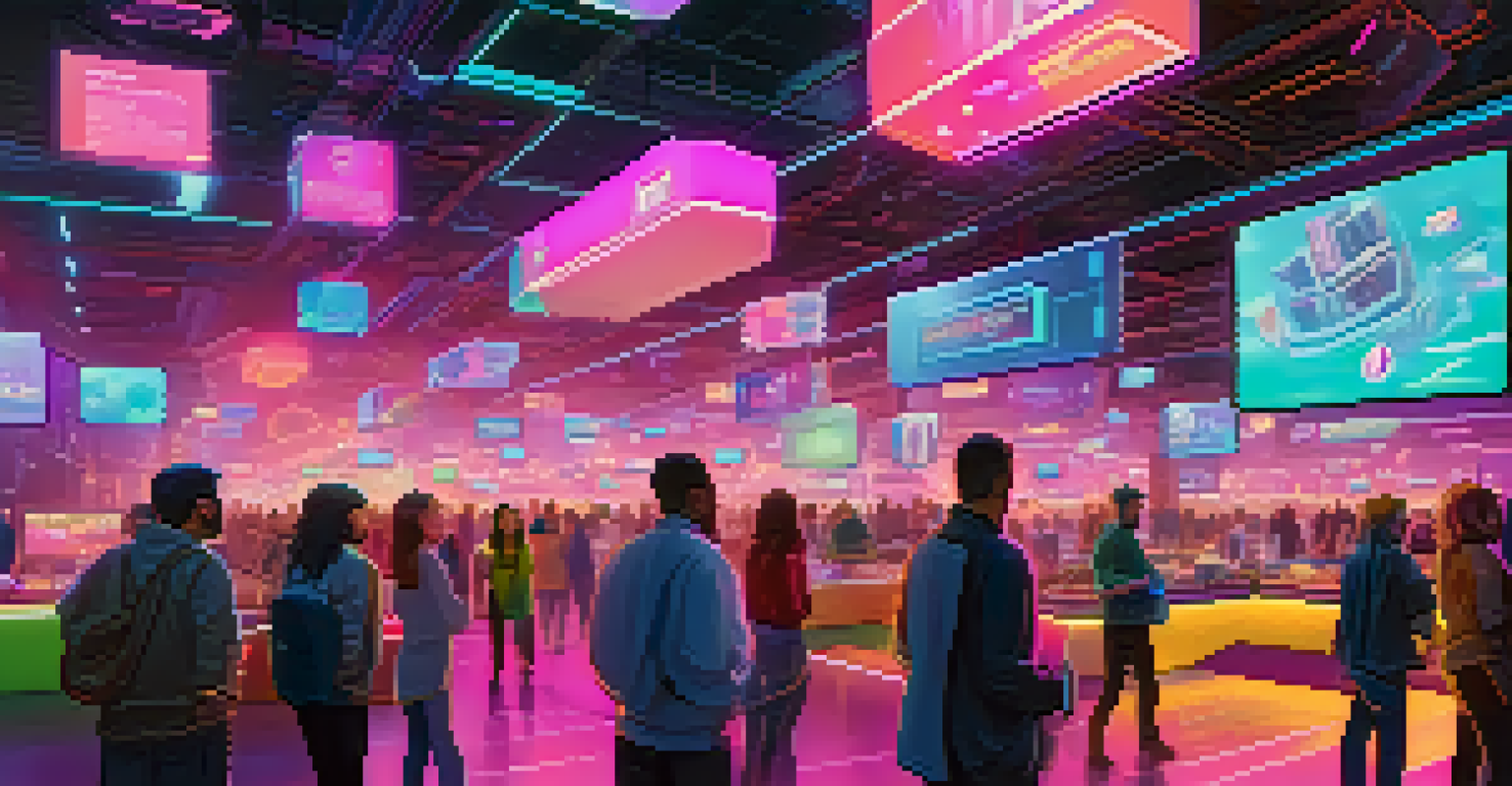Exploring the Intersection of NFTs and Traditional Economics

What Are NFTs and Why Do They Matter?
Non-fungible tokens (NFTs) are unique digital assets verified using blockchain technology. Unlike cryptocurrencies such as Bitcoin, which are interchangeable, each NFT has distinct properties, making it one-of-a-kind. This uniqueness is what drives their value and appeal, especially in art, music, and gaming industries.
NFTs allow artists to sell their work directly to their audience, empowering them and redefining the traditional art market.
The rise of NFTs has opened new avenues for creators to monetize their work directly, bypassing traditional intermediaries like galleries and record labels. For instance, a digital artist can sell their artwork directly to collectors, maintaining more control and earning a larger share of the profits. This shift is significant in how we think about ownership and value in the digital age.
Moreover, NFTs challenge the traditional economic principles of scarcity and ownership. As more creators and consumers engage with this technology, we begin to see a redefinition of what it means to own something in a digital world, prompting deeper discussions about value and investment.
The Economic Principles Behind NFTs
At the core of economics are principles like supply and demand, and NFTs introduce a fascinating twist to these concepts. While the supply of NFTs can be controlled by creators, demand often fluctuates based on trends, community interest, and perceived value. This dynamic creates an environment where prices can soar or plummet almost overnight.

For instance, a viral moment can dramatically boost demand for a specific NFT, leading to skyrocketing prices. Conversely, if the hype fades, that same NFT may lose value, illustrating the volatility often seen in speculative markets. This unpredictability makes NFTs a compelling case study for modern economic theories.
NFTs Redefine Digital Ownership
NFTs challenge traditional notions of ownership by enabling unique digital assets to be owned and traded, fostering new economic models.
Additionally, the concept of value in traditional economics often hinges on tangible assets. However, NFTs challenge this notion, as their value is largely subjective and can be influenced by cultural significance or emotional connections, much like traditional art. This shift prompts economists to rethink what constitutes value in a digital economy.
NFTs and Market Speculation: A Double-Edged Sword
Speculation plays a significant role in the NFT market, where investors often buy with the hope that prices will rise. This speculative nature can create bubbles, much like what has been observed in other markets, such as real estate or tech stocks. Understanding this can help potential buyers make informed decisions rather than getting swept up in the frenzy.
The future of ownership is digital, and NFTs are at the forefront of this transformation.
For instance, many early adopters of NFTs saw substantial returns, encouraging others to jump in. However, the rapid fluctuations in value can also lead to substantial losses, highlighting the risks involved. It's crucial for investors to approach this market with caution and a clear understanding of their financial goals.
This speculative aspect raises concerns about the sustainability of the NFT market in the long run. While some NFTs may hold enduring value, others could fade into obscurity, reinforcing the idea that not all investments are created equal. It's a reminder that, like any market, thorough research and critical thinking are essential.
The Role of Digital Ownership in Today's Economy
Digital ownership, a concept brought to the forefront by NFTs, is reshaping how we view property rights in the digital space. Traditionally, owning something meant having a tangible item in your possession, but NFTs challenge this idea, allowing individuals to own digital representations of assets. This evolution prompts intriguing questions about what it means to own something in a digital landscape.
Consider the music industry: artists can now tokenize their songs as NFTs, allowing fans to own a piece of their work. This not only empowers creators but also creates a novel form of engagement between artists and their audience. As consumers, we’re witnessing a shift from passive consumption to active participation in the ownership of digital content.
Market Volatility and Speculation
The NFT market is characterized by speculation, leading to rapid price fluctuations that can result in significant financial risks for investors.
However, as digital ownership becomes more prevalent, it also raises questions about copyright and intellectual property. How do we protect these assets, and what legal frameworks are needed to ensure fairness? These questions will shape the future of both NFTs and traditional economics, making it a critical area for discussion.
NFTs as a New Investment Asset Class
As NFTs gain popularity, many investors are beginning to view them as a new asset class, comparable to stocks or real estate. This perspective presents both opportunities and challenges. On one hand, NFTs can diversify an investment portfolio, adding a unique layer of potential returns. On the other hand, the market's volatility can pose significant risks.
Investors must consider factors like rarity, artist reputation, and historical sales data when evaluating NFTs, much like they would with traditional assets. This analytical approach can help mitigate risks and guide investment decisions in a landscape that is still relatively new and evolving.
Moreover, the emergence of NFT marketplaces has made buying and selling these assets more accessible. With platforms catering specifically to NFTs, investors can navigate this space with greater ease, although doing thorough research remains essential. As the market matures, we can expect to see more sophisticated investment strategies emerge.
The Environmental Debate Surrounding NFTs
One significant concern regarding NFTs is their environmental impact, primarily due to the energy-intensive processes involved in blockchain transactions. Many NFTs are built on Ethereum, a blockchain that relies on proof-of-work consensus, which demands a vast amount of energy. This has sparked debates about the sustainability of NFTs and their long-term viability.
Critics argue that the environmental footprint of creating and trading NFTs is detrimental, emphasizing the need for more eco-friendly solutions. On the other hand, proponents point out that the technology is still evolving, and more sustainable alternatives, such as proof-of-stake, are being developed. This ongoing dialogue highlights the importance of balancing innovation with environmental responsibility.
Environmental Impact Concerns
The energy-intensive nature of blockchain technology used for NFTs raises environmental concerns, prompting discussions about sustainable practices in the industry.
As consumers and investors become more environmentally conscious, the NFT market may need to adapt to these changing values. This could lead to a surge in demand for NFTs created on more sustainable platforms, ultimately shaping the future of the industry. Addressing these concerns will be crucial in ensuring the longevity of NFTs in the economic landscape.
Future Trends: Where NFTs and Economics Are Headed
Looking ahead, the intersection of NFTs and traditional economics is likely to evolve in fascinating ways. As technology advances and more industries explore the potential of NFTs, we may see them integrated into various economic models. For example, real estate could utilize NFTs for property deeds, streamlining transactions and enhancing transparency.
Additionally, as more people become familiar with NFTs, we may witness a shift in consumer behavior. Consumers might prioritize purchasing digital assets alongside physical goods, blurring the lines between the two. This could lead to new marketing strategies and business models that cater to this evolving landscape.

Ultimately, the future of NFTs in economics is still being written, and it will be shaped by both technological advancements and societal attitudes. As we navigate this exciting frontier, it's essential to stay informed and adaptable, ensuring we harness the full potential of NFTs while addressing the challenges they present.